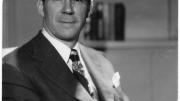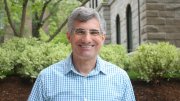Harvard Medical School (HMS) is the recipient of a $90-million gift to spur innovative cancer research at its Ludwig Center, one of six such enterprises located at academic institutions in the United States. The gift to Harvard represents an equal portion (one-sixth) of a $540-million gift bestowed by Ludwig Cancer Research under the terms of the will of the late billionaire Daniel K. Ludwig (1897-1992). Six $90-million gifts will be added to the existing endowments of each of the six U.S. centers, which were initially established with gifts totaling $360 million in 2006. The new gift will now provide in perpetuity an estimated $4 million to $5 million of additional unrestricted funding (in the form of endowment distributions) annually for cancer research at each of the centers.
Massachusetts is the only state to have two Ludwig Centers: one at Harvard, focused on cancer therapy resistance; and one at MIT that studies metastasis, the spread of cancer from one organ to other parts of the body. The four other funding recipients are the Ludwig Centers at Johns Hopkins, which focuses on cancer prevention and early diagnosis; at Memorial Sloan-Kettering Cancer Center, which studies immunology and immunotherapy; at Stanford University, which focuses on cancer and stem cells; and at the University of Chicago, also focused on the study of metastasis.
“This gift provides a momentous opportunity for the entire Harvard Medical School community to glean new insights into the basic biology of cancer as well as to accelerate the translation of basic research to improve patient outcomes,” said Dean Jeffrey S. Flier in a statement. Ludwig Cancer Research had previously given approximately $60 million to Harvard since 2006, including endowed Ludwig professorships and an initial endowment directed specifically toward novel cancer research. The support comes at a critical moment, when resources for cancer research have become constrained globally, particularly in the United States, where federal funding for biomedical research is under pressure from the federal budget sequester.
With the new gift, the medical school will expand its Ludwig Center under co-directors Joan Brugge, Pfeiffer professor of cell biology and chair of the department of cell biology, and George D. Demetri, professor of medicine and Quick Family chair of medical oncology at the Dana-Farber Cancer Institute.
In a news conference, Brugge said that she and Demetri had consulted widely before choosing the specific problem in cancer—resistance to therapy—on which the Harvard Ludwig Center will focus. They plan to build a highly integrated team that will include not only pathologists, oncologists, and geneticists, but also physicists, chemists, engineers, and systems biologists. The center will combine the work of physicians and research scientists—Harvard has particular strength in clinical care through its affiliated research institutions and teaching hospitals. With novel treatments, tumors in some patients can now be made to melt away—only to return as the cancer becomes resistant. Brugge said that it is possible to overcome this resistance, and that the Harvard center would be committed to everything from learning about the causes of resistance to developing “therapeutic strategies to reverse these lapses.”
Demetri said during the news conference that the gift would lead to a new culture of focused collaboration. The “size and permanence” of this new endowment will allow the center to take on “high-risk and -reward strategies” in the fight against cancer by letting researchers “take a long view and aim for a bigger impact” than would be possible in the normal grant-making process.
“In this time of shrinking public funds for science,” he added in a statement, “the impact of this philanthropic funding cannot be overstated: the research that will be enabled by this gift will bring together teams of leading basic scientists and clinical investigators at Harvard, in a collaborative culture with a network of Ludwig Cancer Research institutions, to turn the best of modern science and technology into new strategies for the diagnosis, treatment, cure and prevention of cancer.”
“In many respects, Harvard is uniquely poised to leverage powerful collaborations that span the bench-to-bedside trajectory,” added Flier. “Our campus, along with the medical school’s affiliated hospitals, houses some of the world’s pre-eminent investigators in basic cancer biology. This gift from Ludwig holds the promise of enabling life-changing advances.”









